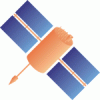Changeset 5601 in ntrip
- Timestamp:
- Jan 22, 2014, 9:59:38 AM (12 years ago)
- File:
-
- 1 edited
-
trunk/BNC/txt/frankfurt.tex (modified) (2 diffs)
Legend:
- Unmodified
- Added
- Removed
-
trunk/BNC/txt/frankfurt.tex
r5599 r5601 31 31 \newcommand{\nl}{\\[4mm]} 32 32 33 \title{ GNSS-Auswertung in Echtzeit}33 \title{Processing GNSS Data in Real-Time} 34 34 35 35 \author{Leo\v{s} Mervart} 36 36 37 \institute{TU Prag} 37 \institute{TU Prague} 38 38 39 \date{Frankfurt, Januar 2014} 39 \date{Frankfurt, January 2014} 40 40 41 41 % \AtBeginSection[] … … 58 58 59 59 \begin{frame} 60 \frametitle{Table of Contents} 61 \tableofcontents 60 \frametitle{Medieval Times of GNSS (personal memories)} 61 62 \begin{description} 63 \item[1991] Prof. Gerhard Beutler became the director of the Astronomical Institute, University of 64 Berne. The so-called Bernese GPS Software started to be used for (post-processing) analyzes of 65 GNSS data. 66 \item[1992] LM started his PhD study at AIUB. 67 \item[1992] Center for Orbit Determination in Europe (consortium of AIUB, Swisstopo, BKG, IGN, and 68 IAPG/TUM) established. Roughly at that time LM met Dr. Georg Weber for the first time. 69 \item[1993] International GPS Service formally recognized by the IAG. 70 \item[1994] IGS began providing GPS orbits and other products routinely (January, 1). 71 \item[1995] GPS declared fully operational. 72 \end{description} 73 62 74 \end{frame} 63 75 64 76 %%%%%%%%%%%%%%%%%%%%%%%%%%%%%%%%%%%%%%%%%%%%%%%%%%%%%%%%%%%%%%%%%%%%%%%%%%%%%%%% 65 77 66 \ section{PPP NB}67 \ subsection{Principles}78 \begin{frame} 79 \frametitle{CODE-Related Works in 1990's} 68 80 69 \begin{frame} 70 \frametitle{Principles of PPP NB (Non-Bias) Service} 71 \framesubtitle{Observation Equations} 81 \begin{itemize} 82 \item The Bernese GPS Software was the primary tool for CODE analyzes (Fortran~77). 83 \item IGS reference network was sparse. 84 \item Real-time data transmission limited (Internet was still young, TCP/IP widely accepted 1989). 85 \item CPU power of then computers was limited (VAX/VMS OS used at AIUB). 86 \end{itemize} 72 87 73 The PPP~NB is based on the processing of the ionosphere-free linear combination of phase 74 observations 75 \be 76 L^{ij}_3 = \varrho^{ij} - c\delta^{ij} + T^{ij} + \bar{N}^{ij}_3 ~, 77 \ee 78 where the ambiguity term is given by 79 \be 80 \bar{N}^{ij}_3 = N^{ij}_3 - l^{ij}_3 81 = \frac{c\;f_2}{f^2_1-f^2_2}\;(n^{ij}_1-n^{ij}_2) + \lambda_3\;n^{ij}_1 - l^{ij}_3 82 \ee 83 and the ionosphere-free linear combination of code observations 84 \be 85 P^{ij}_3 = \varrho^{ij} - c\delta^{ij} + T^{ij} + p^{ij}_3 ~, 86 \ee 87 where the code bias $p^{ij}_3$ is the linear combination of biases 88 $p^{ij}_1,p^{ij}_2$ 88 In 1990's high precision GPS analyzes were almost exclusively performed in post-processing mode. 89 The typical precise application of GPS at that time was the processing of a network of static 90 GPS-only receivers for the estimation of station coordinates. 91 89 92 \end{frame} 90 93 91 94 %%%%%%%%%%%%%%%%%%%%%%%%%%%%%%%%%%%%%%%%%%%%%%%%%%%%%%%%%%%%%%%%%%%%%%%%%%%%%%%% 92 95 96 \begin{frame} 97 \frametitle{Tempora mutantur (and maybe ``nos mutamur in illis'')} 98 99 \end{frame} 100 101 102 %%%%%%%%%%%%%%%%%%%%%%%%%%%%%%%%%%%%%%%%%%%%%%%%%%%%%%%%%%%%%%%%%%%%%%%%%%%%%%%% 103 104 \begin{frame} 105 \frametitle{} 106 107 \end{frame} 108 109 %%%%%%%%%%%%%%%%%%%%%%%%%%%%%%%%%%%%%%%%%%%%%%%%%%%%%%%%%%%%%%%%%%%%%%%%%%%%%%%% 110 111 \begin{frame} 112 \frametitle{} 113 114 \end{frame} 115 116 %%%%%%%%%%%%%%%%%%%%%%%%%%%%%%%%%%%%%%%%%%%%%%%%%%%%%%%%%%%%%%%%%%%%%%%%%%%%%%%% 117 118 \begin{frame} 119 \frametitle{} 120 121 \end{frame} 122 93 123 \end{document}
Note:
See TracChangeset
for help on using the changeset viewer.
